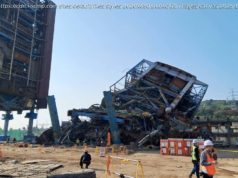A top Russian general reportedly intervened to stop an attack from the U. S., preventing a repeat from last month in which many Russians were killed.
Defense Secretary James Mattis revealed Tuesday that U. S. forces nearly bombed Russians fighting on behalf of Syrian President Bashar al-Assad sometime in the past week, but a call with Moscow’s own armed forces defused the situation.
Mattis said he believed Russian military officials when they said they were not giving orders to private Russian citizens battling the Islamic State militant group (ISIS) and rebel groups as part of a coalition of pro-Syrian government militias. Following an incident last month, in which the U. S.-led coalition against ISIS killed a large number of these pro-Assad fighters, including Russians, Mattis said another clash was recently avoided after Marine Corps General Joseph Dunford, chairman of the Joint Chiefs of Staff, contacted Russia’s top military leader, Army General Valery Gerasimov, via a deconfliction hotline.
Related: Russia Says It Will Attack U. S. Military if Trump Strikes Syria Again
„There were other Russian elements like this moving across the deconfliction line, which is the river, as you know, into an area that we’d agreed with the Russians they could operate in, as they had allowed us to operate basically to the west of the river, up at Tabqa and around Raqqa. We’d agreed for them being slightly east of the river at Deir Ezzor,“ Mattis told reporters at the Pentagon.
„These were forces moving into more advanced positions, too close. Deconfliction discussions between our chairman and his Russian counterpart, General Gerasimov [took place] and those elements fell back. So we have also drawn off slightly in order to maintain a deconfliction between the elements there,“ he continued.
„So it looks like, this time, it was resolved through the deconfliction communication line. It did not, you know, go into harm’s way, as it did there a month ago,“ he added.
In this still from footage released by the Defense Department, a U. S. MQ-9 Reaper drone, also known as Predator B, destroys a Russia-built T-72 tank in eastern Syria, on February 10. The U. S. said the strike was in self-defense as pro-Syrian government forces advanced on Pentagon-backed fighters on the ground. U. S. DEPARTMENT OF DEFENSE
Keep up with this story and more by subscribing now
The battleground in eastern Syria has only grown more complex as the U. S.-led, mostly Kurdish Syrian Democratic Forces and the Russia-backed Syrian military fought two separate campaigns to destroy ISIS. As the Syrian military, backed by various pro-government militias—many of which were supported by Iran—and Russian warplanes, retook Deir Ezzor city and the border town of Al-Bukamal, they declared victory over ISIS and reclaimed the region for Assad.
On the other side of the Euphrates River, however, the Syrian Democratic Forces maintained control of lucrative oil fields. The Kurdish leadership had reportedly entered into preliminary talks with the Syrian government to negotiate the return of these sites in exchange for greater autonomy across majority-Kurdish northern Syria, but two major developments have upset the dynamics of eastern Syria.
First, Turkey protested to a U. S. plan to establish a Syrian Democratic Forces border force. Turkish President Recep Tayyip Erdogan threatened to crush the U. S.-backed Kurdish “ terror army “ he accused of being linked to the banned Kurdistan Workers‘ Party (PKK) that has waged a decades-long separatist guerrilla war in Turkey. Turkey rallied its rebel, once-CIA-backed Free Syrian Army allies in January to take the Kurd-held town of Afrin and Kurdish fighters have left the U. S.-led coalition frontlines in eastern Syria to resist the spreading Turkish invasion alongside pro-Syrian government forces as part of a deal with Assad .
Not long after, the mostly Arab faction of the Syrian Democratic Forces in eastern Syria said they had come under attack by pro-Syrian government forces. The U. S.-led coalition responded with massive force, killing up to 100 pro-Assad fighters, including at least dozens of Russian citizens—many of which were reportedly operating as part of private military companies.
Russia stated it had no control over Russian nationals working outside the military, but blamed the U. S. for provoking the attack and denied coalition claims that the U. S. had contacted Russian military officials before, during and after the attack. A U. S. drone killed more pro-Syrian government forces in a Russian tank days later.
Russian military police stand guard at the Al-Wafideen checkpoint on the outskirts of the Syrian capital Damascus neighboring the rebel-held eastern Ghouta enclave, March 13,2018, awaiting any civilians evacuating from the area. Most rebel groups have surrendered in the region, but setbacks in negotiations between the government and the Islamist Jaysh al-Islam signaled a potential renewal to fighting. LOUAI BESHARA/AFP/Getty Images
While the degree to which Gerasimov was able to influence irregular Russian fighters on the ground was unclear, the elite general issued a direct warning that the U. S. military must not place his troops in danger. As negotiations over the evacuation of civilians and rebels from the insurgent-held districts outside of Damascus accompanied a violent Syrian air campaign earlier this month, U. S. ambassador to the United Nations Nikki Haley warned that „the United States remains prepared to act“ in response to reports of chemical weapons and civilian casualties.
Russia has denied its Syrian ally’s involvement in chemical weapons attacks, including an alleged sarin gas attack last April that convinced President Donald Trump to launch airstrikes at a Syrian air base, a move Russia argued threatened the lives of its personnel. In response to Haley’s renewed threat against the Syrian military, Gerasimov said he would „take retaliatory measures to target both the missiles and their delivery vehicles“ if Russian lives were put in harm’s way.
Start
United States
USA — Events U. S. Almost Attacked Russians In Syria Again But Moscow Stepped in,...






